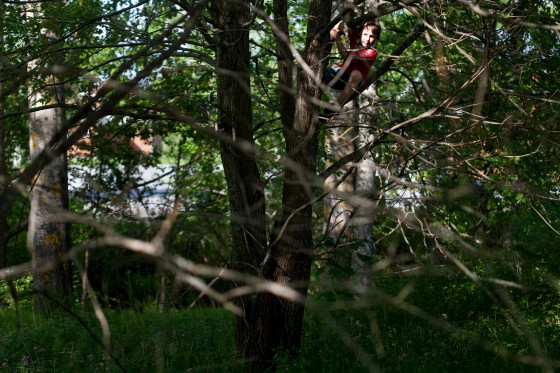 Kuva: Tuomas Linna
Kuva: Tuomas Linna The nature of the studies of universities of applied sciences and other universities varies greatly by sector, so also in terms of hearing, they are associated with their own particular special features. Compared to previous studies, the large amount of people in the premises and participating in the teaching situations is typically new. In some sectors, the study environment may be very international, in which case the student should also be able to communicate fluently in foreign languages.
Teaching may take place as mass lectures in large halls, so the existence and operations of an induction loop should be ensured in good time before the start of the studies. Moreover, the continuous change of lecturers requires persistence to take care of possibilities to follow-up on the teaching.
The means of facilitating the progress of studies that apply in university are the same principles as those that apply in secondary education. The information provided in higher education institutions is, however, more specific than that of lower levels of education, and awkward names and phrases may arise during lectures at a very rapid pace.
Thus, both the student’s participation and interpretation is facilitated, if the lecture material can be familiarised in, in advance or at least the subject is known. Nowadays, this is often the case.
Studies at both universities of applied sciences and other universities may include mandatory work placements, in which the conditions may be challenging in terms of hearing. Adjustments or special arrangements are often possible to be made to these as well.
Ask for advice in advance
In higher education institutions, teachers and lecturers are also often foreign. Even explaining the special needs regarding hearing may cause misunderstandings affecting the course performance, due to language and cultural differences.
The beginning of the lecture can be a tricky place to explain the use of an FM device or the interpreter’s presence, so they are good to be informed about in advance by e-mail. It is especially recommended to notify the teacher in advance, in case of language courses, where the teacher is native, i.e. speaks such language as their mother tongue.
Higher education institutions provide great opportunities for student exchange, which can be useful for employment. Alongside hearing and communication abilities, the student’s persistent and transparent attitude and social behaviour is of great importance in succeeding in the exchange.
Enrolment
The joint enrolment for higher education studies is usually in May or April. Almost all sectors have entrance exams, which can, in addition to the written test, include aptitude tests or interviews. In particular, if the studies directly qualify for a profession, the health recommendations or requirements regarding the profession are good to clarify before applying.
A separate application may be required for special arrangements of an entrance examination, which must be received up to a couple months before the arrangement of the entrance examination. The required documents to be attached to the application form have different practices, but often, for example, the Finnish Matriculation Examination Board decision or a medical statement for special arrangements is required.
The duration of higher education studies varies, the interval is usually from 3.5 to 4.5 years. In some fields of study, a higher degree is also offered. In universities, the bachelor’s studies have been set for three years and Master studies for two years. A combined amount of up to seven years can be used for them, unless an extension is granted.
Sign language studies
Academic sign language and its associated cultural studies can be studied at the University of Jyväskylä, where the teaching takes place in Finnish and English, in addition to Finnish sign language. The Sign Language Centre has also been opened in the University of Jyväskylä in 2010, which coordinates sign language related training and research together with other parties.
Sign language interpretation can be studied at the Humanities University of Applied Sciences (Humak) in the Helsinki Metropolitan area and in Kuopio, as well as at the Diakonia University of Applied Sciences in Turku. An interpreter is usually required to have normal hearing, but the content of the four-year degree at Humak has also be adapted to those with hearing disabilities.
More information
• Kuulovammaisen henkilön elämänkulku lapsuudesta aikuisuuteen. Elina Lehtomäki & Kirsi Niemi. Teoksessa Lonka, Eila & Korpijaakko-Huuhka, Anna-Maija. Kuulon ja kielen kuntoutus. Vuorovaikutuksesta kommunikointiin. Palmenia-kustannus 2000.




